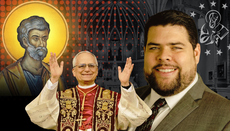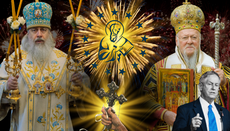A Step Toward Truth: Lutherans Move to Remove the Filioque

The Lutheran-Orthodox Commission calls for a return to the original Creed—exposing the filioque for what it truly is: a symbol of papal arrogance and doctrinal innovation.
Earlier this month, the Lutheran-Orthodox Commission met for a special session to commemorate the 1,700th anniversary of the First Ecumenical Council. It came to an historic decision. According to the official statement: “The Lutheran-Orthodox International Joint Commission recommends that all Lutheran churches who do not already do so begin using translations of the Nicene Creed based upon the original Greek wording, without the filioque.”
This is long overdue.
For those who don’t know, the original text of the Nicene Creed says: “And in the Holy Spirit, the Lord, the Giver of Life, who proceeds from the Father, who with the Father and the Son is worshiped and glorified.”
However, in A.D. 589, the Third Council of Toledo–a local council in Spain–modified the Creed to say: “And in the Holy Spirit, the Lord, the Giver of Life, who proceeds from the Father and the Son, who with the Father and the Son is worshiped and glorified.” (This phrase “and the Son” is FIlioque in Latin.)
Toledo added the filioque clause in order to emphasize the divinity of Christ. The Arian heresy was not fully extinguished in Spain until late in the 7th century. However, this addition was opposed stridently by the early Popes.
This began to change as the Franks became the dominant political force in the West. The Frankish kings wished to replace the Byzantine Emperors as the heirs to Rome. However, much of Byzantines’ authority in Eastern Europe was founded on their reputation as the guardians of traditional Christianity.
So, the Franks sent missionaries to the Slavs, claiming that the Byzantines had taught them a false gospel. They claimed that the filioque had been part of the original Nicene Creed (as established by the first two Ecumenical Councils), but that the Greeks had taken the phrase out. This was a total lie—but it was a lie that served Frankish interests.
All the while, the Franks pressured Rome to add the filioque to the Creed. The popes staunchly refused—that is, until 1024, when Pope John XIX finally gave in. This is the year that Rome “officially” began to use the filioque. This quickly led to the Great Schism of 1054: the permanent separation of Rome from the Orthodox Church.
Now, Lutherans may not care about the Schism. They may not even recognize the authority of the Councils. However, they should realize that the filioque is the ultimate symbol of arbitrary papal power.
But what about the theology of the filioque? Isn’t that sound?
The underlying theology of the filioque is called the double procession of the Holy Spirit. It was defined dogmatically by the Roman Church in 1438: “The Holy Spirit is eternally from Father and Son; He has his nature and subsistence at once from the Father and the Son. He proceeds eternally from both as from one principle and through one spiration.”
The Orthodox consider this position to be heretical for several reasons, the two most important of which have to do with Scripture and Tradition.
First, the argument from Scripture. In John’s Gospel, Christ explicitly states that the Holy Spirit proceeds from the Father, without reference to Himself: “But when the Helper comes, whom I shall send to you from the Father, the Spirit of truth who proceeds from the Father, He will testify of Me” (John 15:26).
It’s true that Christ says that He will send the spirit. Some argue that this is the “proper” meaning of the filioque: that the Spirit proceeds eternally from the Father while proceeding from Christ in time. But this is not Rome’s official, dogmatic understanding of the filioque.
Of course, the Orthodox agree that the spirit proceeds from the Son in time. How could we not? Christ Himself taught this! Unfortunately, that is not what the Roman Church teaches.
Again, the Council of Florence—which they consider to be infallible—says that the Spirit “proceeds eternally from both as from one principle and through one spiration.” They do not allow for any distinction between the eternal and temporal procession.
Next is the argument from tradition. About seventy years after the Nicene Creed was set down, the Fourth Ecumenical Council declared the following:
This wise and saving creed, the gift of divine grace, was sufficient for a perfect understanding and establishment of religion. For its teaching about the Father and the Son and the Holy Spirit is complete, and it sets out the Lord’s becoming human to those who faithfully accept it. But there are those who are trying to ruin the proclamation of the truth, and through their private heresies they have spawned novel formulas.
Do you see? The teaching of the Nicene Creed is “complete.” Any further revisions would “ruin the proclamation of truth.” We must therefore reject “novel formulas.”
How could we argue that the Fathers of the First and Second Ecumenical Council believed that the Spirit proceeded from the Son as well as the Father, but simply omitted this from the Creed? How can we argue that the Fathers of the Fourth Ecumenical Council believed in the filioque, and yet said that the Creed’s teaching on the Holy Spirit is “complete” without it?
I suppose in the same way that we could argue that Christ simply neglected to mention that the Spirit proceeds from Himself as well as the Father.
Lutherans believe in Sola Scriptura; they do not believe in the authority of Tradition (at least, not in the way that Orthodox Christians do). Still, they may find this argument compelling.
The filioque is not taught in the Bible, nor was it believed in the first centuries of the Church. It was added to the Creed unilaterally by the Pope—contrary to the witness of Holy Scripture, Tradition, the Ecumenical Councils, and his fellow bishops—in the most egregious exercise of papal absolutism in history.
Lutherans have every reason to stop using the filioque and no reason to continue. This is a welcome development that should be celebrated by Protestants and Orthodox Christians alike.









